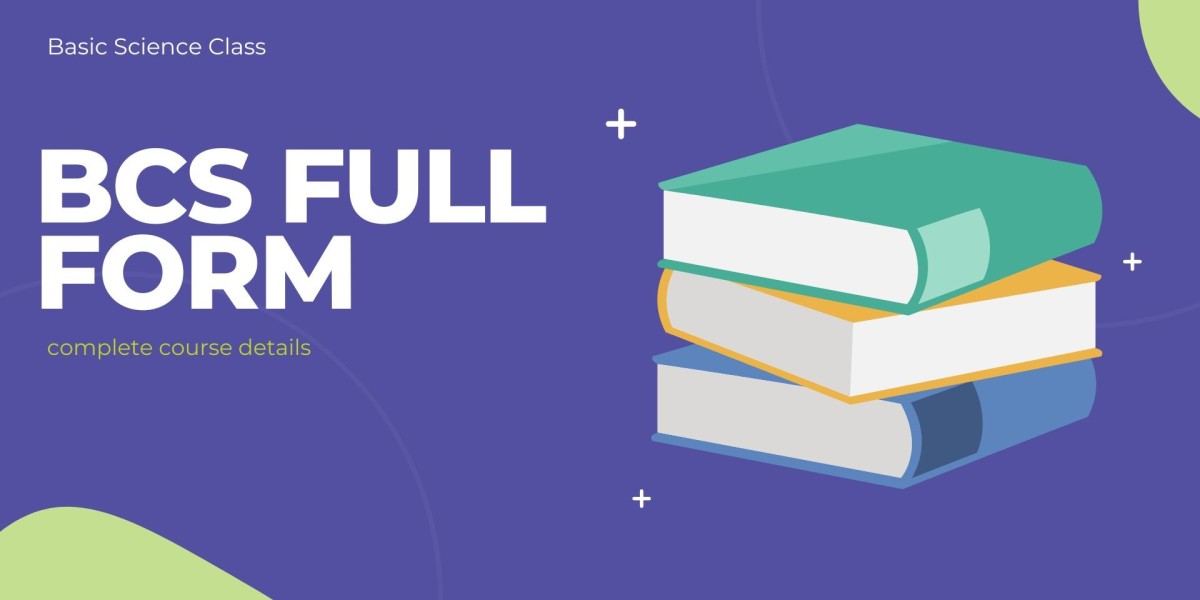Embarking on a Bachelor of Computer Science (BCS) degree is an exciting journey that can open up numerous career opportunities in the rapidly growing field of technology. Whether you're passionate about software development, artificial intelligence, or cybersecurity, a BCS degree can provide the foundation needed to thrive in these fields. However, starting this journey can seem overwhelming for new students. This comprehensive guide will help you understand the steps involved in getting started with a BCS degree, from understanding the BCS full form to managing coursework, internships, and career opportunities.
What is the BCS Full Form?
Before diving into the details of pursuing a BCS degree, it's important to understand what "BCS" stands for. The BCS full form is Bachelor of Computer Science. It is an undergraduate program focused on providing a comprehensive understanding of computer science concepts, including programming, data structures, algorithms, artificial intelligence, computer networks, and more. The program is designed to equip students with the skills needed to design software, solve technical problems, and adapt to the ever-evolving world of digital technology.
Why Choose a BCS Degree?
The BCS degree is highly regarded in the world of information technology (IT) due to its broad curriculum and hands-on approach. With technology becoming an integral part of every industry, the demand for skilled professionals in computer science has never been higher. By earning a BCS degree, you can:
- Gain in-depth knowledge of core computer science topics.
- Learn essential programming languages such as Python, Java, and C++.
- Develop skills for problem-solving and critical thinking.
- Prepare for a wide range of career opportunities in tech, such as software development, data analysis, IT consulting, and more.
Step 1: Research BCS Programs and Choose the Right One for You
Before enrolling in a BCS program, it’s essential to research different universities and institutions that offer the degree. Some of the key factors to consider are:
- Accreditation: Make sure the program is accredited by a recognized educational body to ensure its quality and your degree’s recognition in the job market.
- Curriculum: Different institutions may offer different specializations within computer science. Check if the curriculum aligns with your interests, whether that’s software development, cybersecurity, data science, or AI.
- Reputation and Alumni Network: A reputable university with a strong alumni network can help you with internships, job placements, and valuable connections in the industry.
- Location and Flexibility: Consider whether you want to study in a particular city or if you need flexibility, such as an online or part-time program.
Step 2: Understand the Prerequisites
Most BCS programs have certain prerequisites that you need to meet before being admitted. These typically include:
- Strong Math Skills: Mathematics plays a key role in computer science. You’ll encounter subjects like discrete mathematics, probability, and linear algebra. A solid understanding of high school-level math is essential.
- Programming Knowledge: While it’s not always required, having a basic understanding of programming languages can give you a head start. If you’re new to coding, consider learning the basics of languages like Python or Java before starting the program.
- English Language Proficiency: As the primary language of instruction for most BCS programs is English, you might need to demonstrate your proficiency in English through tests like IELTS or TOEFL if English is not your first language.
Step 3: Plan Your Study Schedule
Once you’ve enrolled in a BCS program, managing your time effectively is crucial. The curriculum can be demanding, with both theoretical and practical coursework. Here’s how you can plan your study schedule:
- Set Priorities: Prioritize your tasks based on deadlines and exam schedules. Make sure you allocate enough time for assignments, projects, and exams.
- Use Study Aids: There are numerous online resources, including tutorials, courses, and forums, that can help you understand complex topics. Websites like Stack Overflow, Khan Academy, and Coursera can provide additional learning material.
- Time Management: Break down your assignments into smaller tasks and set daily or weekly goals. Use tools like Google Calendar or Trello to stay organized and on track.
Step 4: Gain Practical Experience
While theoretical knowledge is essential, hands-on experience is just as important when pursuing a BCS degree. Here are some ways you can gain practical experience:
- Coding Practice: Practice coding regularly by solving problems on platforms like LeetCode, HackerRank, or Codewars. This will help you improve your problem-solving and coding skills.
- Projects: Participate in class projects or work on your own side projects. Creating your own software or contributing to open-source projects will enhance your portfolio and make you stand out to potential employers.
- Internships: Internships are an excellent way to gain real-world experience. Many tech companies offer internships to BCS students, which can provide valuable exposure to the industry, networking opportunities, and possibly even job offers after graduation.
Step 5: Focus on Key Skills for Success
To succeed in the BCS program and in the tech industry, you need to focus on developing both technical and soft skills. Here are some key skills to work on:
- Programming Languages: Learn and master programming languages like Python, Java, C++, or JavaScript. Each language has its use cases, and being proficient in multiple languages will make you more versatile.
- Problem-Solving Skills: Computer science is all about solving problems efficiently. Practice solving algorithm and data structure problems to improve your analytical thinking.
- Teamwork and Communication: Many projects in the tech industry require collaboration. Improve your teamwork skills and learn to communicate complex technical concepts clearly to non-technical stakeholders.
- Adaptability: The tech industry evolves rapidly. Stay curious and open to learning new technologies, tools, and methodologies.
Step 6: Explore Career Opportunities
After completing your BCS degree, you’ll have a wide range of career options to choose from, including:
- Software Developer: Design, build, and maintain software applications for various platforms.
- Data Scientist: Analyze large datasets to extract meaningful insights and help businesses make data-driven decisions.
- Cybersecurity Expert: Protect organizations from cyber threats by identifying vulnerabilities and implementing security measures.
- Artificial Intelligence (AI) Specialist: Work on developing intelligent systems that can perform tasks that would normally require human intelligence, such as speech recognition or decision-making.
Step 7: Continuing Education and Certifications
The tech industry is constantly evolving, so it’s essential to continue learning even after earning your BCS degree. Here are some ways to continue your education:
- Certifications: Earn certifications in specific areas like cloud computing (AWS, Azure), data science, or cybersecurity. These certifications can enhance your resume and demonstrate your expertise.
- Postgraduate Studies: Consider pursuing a master’s degree in computer science or a related field to specialize further in a particular area.
Conclusion
Pursuing a BCS degree is an exciting and rewarding journey that can set you up for a successful career in the ever-growing field of technology. By following this guide, you can ensure a smooth start to your BCS program, develop essential skills, gain practical experience, and open doors to numerous career opportunities. Remember, the BCS full form represents not only a degree but also a gateway to a fulfilling and dynamic future in the tech industry.
FAQs
What is the BCS full form? The BCS full form is Bachelor of Computer Science, an undergraduate program designed to teach fundamental computer science principles and programming skills.
Do I need to know programming before starting a BCS degree? While it’s not mandatory to know programming before starting, having a basic understanding of programming languages can be helpful. Consider learning Python or Java before enrolling.
What kind of jobs can I get with a BCS degree? A BCS degree opens up a wide range of job opportunities, including roles like software developer, data scientist, cybersecurity analyst, and AI specialist.
How can I gain practical experience while studying for a BCS degree? You can gain practical experience through coding practice on platforms like LeetCode, working on projects, and participating in internships with tech companies.
Can I pursue a master’s degree after completing a BCS degree? Yes, after completing a BCS degree, you can pursue a master’s degree in computer science or a related field to specialize further in areas like data science, AI, or cybersecurity.








